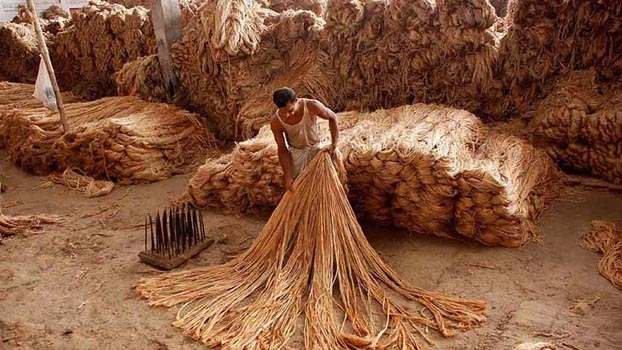Jute turns export booster amid virus pandemic

The export earnings from the jute and jute-made goods witnessed a healthy growth during the July-April period in current fiscal despite the ongoing worldwide shutdown due to the coronavirus pandemic.
The earnings from this sector secured second place after the readymade garments (RMG) pushing down the leather sector to the third place for the first time after losing its glory as the most export earning product as well as the golden fibre.
The export earnings from this sector stood at $791.30 million during July-April period in current fiscal year, 2019-20, which is 14 percent more than the earnings of the same period of previous fiscal, according to the Export Promotion Bureau (EPB).
It is also higher than the strategic export target of 17 percent during the period of the current fiscal.
Experts said jute is turning out to be an important natural and environment-friendly raw material for multifarious use as its demand is increasing at home and abroad in the backdrop of the global awareness towards ‘green’ solutions.
Market analysts said the prices of jute and jute products in the world market have increased by 20 to 25 percent while the price of raw jute has increased by more than 30 percent.
They said the demand for jute and jute products has increased due to the reduction in the use of polythene in the world in response to the demands of environmentalists.
Hence, it is high time the government expands this sector through ensuring quality and diversifying the market across the globe, they added.
The Textiles and Jute Secretary Lokman Hossain Mia said the demand for jute-made goods is growing abroad especially in Europe and other Western countries as people have become much more aware of using natural fibre.
“We are producing newer jute products with different dimensions, besides steps have been taken to make effective branding of local jute products in the international market,” he added.
For this, the export and variety of jute-made goods are gradually increasing, he further said.
Mia said the government has extended all supports along with cash incentives for ensuring product diversification, modern machinery, and equipment to boost this sector.
An SME entrepreneur in this sector Esrat Jahan Choudhury told Bangladesh Post the demand for diversified jute products is increasing in the global market for which the export of jute and jute-made goods is also increasing.
She said the scope for boosting the huge local and international market of jute-made goods has been created considering the growing demand as well as the widespread use of shopping and food-grade bags, composite, geo-textile, pulp and paper.
“We are now passing difficult time due to Covid-19 pandemic,” she said adding, “If this situation continues, we will have to incur a huge loss. Hence, we request the government for taking the necessary steps to save this sector.”
World Bank’s former lead economist Zahid Hussain told Bangladesh Post, “The government should take multiple initiatives to create new entrepreneurs to boost this sector. However, only financial support is not enough.”
The government should provide this sector with all business supports, including infrastructure, market survey for choosing the best products, and creating markets for selling the products to get the best result from them, he added.
“At the same time, the government will have to create skilled manpower to meet local and overseas demands,” he said.
Thousands of small and cottage industries set up throughout the country over the years are ensuring bread and butter to millions without adequate government supports, he added.
Bangladesh is now exporting jute and jute-made goods to a number of countries like Afghanistan, Algeria, Austria, Belgium, Benin, Brazil, Bulgaria, Canada, Chile, China, Congo, Costa Rica, Egypt, Italy, Indonesia, Ethiopia, Gambia, Germany, Haiti, India, Ireland, Iran, Japan, Jordan, Korea, Libya, Malaysia, Mexico, Morocco, Myanmar, the Netherlands, Pakistan, Poland, Portugal, Romania, Russia, Saudi Arabia, Sudan South Africa, Taiwan, Tajikistan, Thailand, Turkey, the USA, the UK, Uganda, Uzbekistan, and Vietnam, according to the EPB.
There are some 22 state-owned jute mills and some 200 private sector jute mills in the country.




